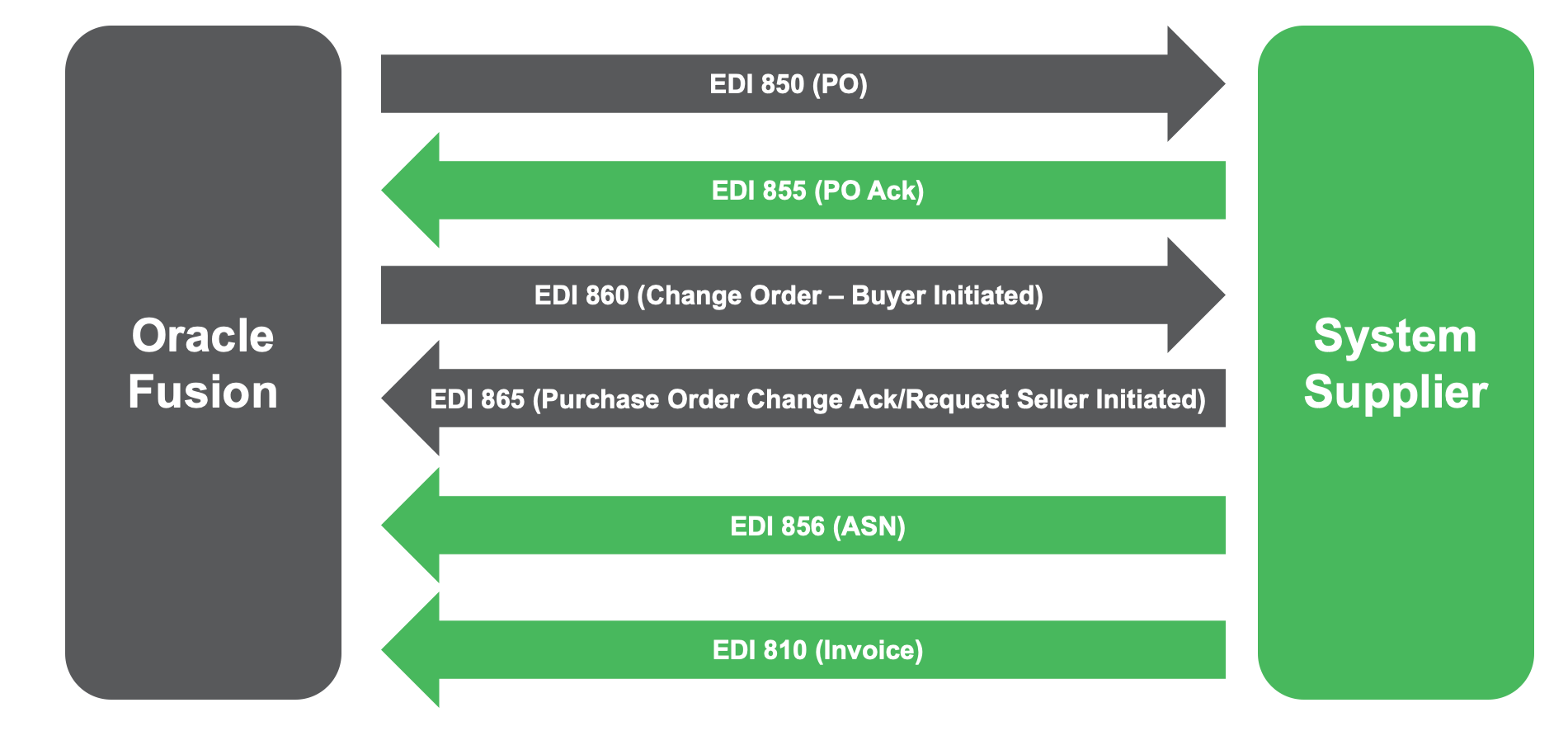Using EDI to support purchasing processes in Oracle Fusion Cloud
In supply chain management, procurement is a vital business process that involves multiple stakeholders — including the procuring organization, buyers, planners, sourcing managers, and suppliers — and their respective IT Systems. The procurement process requires extensive data exchanges between the procuring and supplying organizations. These data exchanges establish the roadmap for all future transactions between the two entities.
The buying process typically starts with the creation of a purchase requisition, which is converted into a purchase order. Purchase orders are communicated to the supplier via phone, fax, or email. There are multiple attributes exchanged between the two entities critical for the procurement process. They include the purchase order number, supplier, supplier site, buyer, item, quantity, price, ship-to location, bill-to location, requested delivery date, promised delivery date, payment terms, shipping method, and freight terms.
These attributes are subject to change and are managed through change order management. This makes the entire process cumbersome and error-prone. Consequently, there is a need to improve communication and simplify the change management process which, in turn, will enhance the end-to-end procure-to-pay process.
What is EDI?
EDI, which stands for electronic data interchange, enables the systematic exchange of business data between trading partners. It is an alternative to traditional approaches like using mail, faxes, and emails to communicate information. EDI minimizes users’ participation in the data exchange process because EDI documents can flow straight from the buyer’s IT system to the seller’s, thereby improving the data exchange process.
Key EDI transactions in Procure-to-Pay
In Oracle Fusion Cloud Procure-to-Pay, EDI uses multiple codes to facilitate business processes. Each EDI code resembles a designated step in the procure-to-pay cycle and can be categorized as either an inbound or outbound transaction depending on who is the recipient of the data. The codes include:
- EDI 850 - Purchase Order (outbound, from the buyer to the supplier)
- EDI 855 - Purchase Order Acknowledgement (inbound, to the buyer from the supplier)
- EDI 860 - Purchase Order Change Request – Buyer Initiated (outbound, from the buyer to the supplier)
- EDI 865 - Purchase Order Change Acknowledgement/Request – Supplier Initiated (inbound, to the buyer from the supplier)
- EDI 856 - Advance Shipment Notice (inbound, to the buyer from the supplier)
- EDI 810 – Invoice (inbound, to the buyer from the supplier)

Key considerations to facilitate EDI transactions
The following steps can be taken to facilitate data exchanges between buying and supplying systems (assuming the procurement module is pre-configured):
- Conduct data mapping for attributes to be exchanged
- Configure collaboration messaging framework
- Enable supplier for EDI transactions
- Configure approval rules for purchase orders
- Configure change order template
- Maintain item cross-references
- Establish error handling framework
Understanding the Collaboration Messaging System
Oracle’s Collaboration Messaging Framework (CMK) enables Oracle Fusion applications to establish business-to-business (B2B) message-exchanging capabilities with customers or suppliers. It can use predefined service providers, including Justransform.com and Oracle Business Network. If one of these is being used, then all documents and messages are already set up.
Each trading partner is defined using the “Manage B2B Trading Partners” task for predefined service providers. Next, select the documents to be exchanged with the trading partner and then associate the trading partner with the suppliers participating in the EDI process.
CMK transforms B2B documents like purchase orders into an XML format and sends them to the service provider. The service provider transforms that information into a supplier-specific format which is subsequently consumed by the supplier’s order management system.
Inspirage can help
As a result, the EDI process provides extensive benefits to both the buying and supplying entities. It enables business automation, which in turn reduces costs, and offers seamless data exchange with better turnaround time on transactions. It also mitigates errors and increases data accuracy between the procuring organization and supplying entities. EDI offers a perfect blend of automation, improved business processes, enhanced turnaround time, and data accuracy. To learn more visit How You Configure Collaboration Messaging Framework or contact us today.
As the Integrated Supply Chain Specialists, with recognition from Gartner, IDC, and winners of Oracle’s 2021 Game Changer Award for SCM Service Delivery Partner of the Year, Inspirage is uniquely qualified to be your success partner. Whether you are upgrading your on-prem system or have decided to move to the cloud where continuous improvement is built-in, our team is prepared to guide you on your transformational journey.
